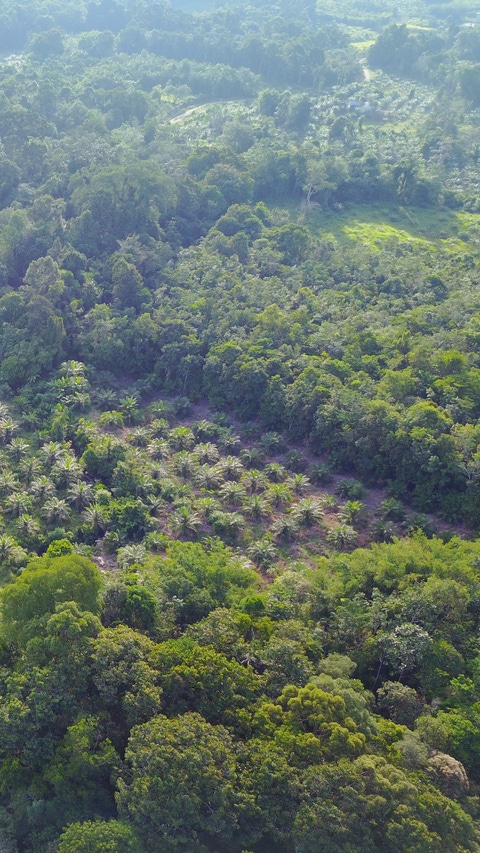Sustainability
Forest Protection
Forests are essential for life on Earth. Forests hold the majority of the world's terrestrial biodiversity, regulate the water cycle, prevent soil erosion, provide clean air and are a living environment for endangered animals and indigenous communities. As forests are also a major global carbon sink, protecting and restoring forests plays a crucial role in reducing climate change.
Through human activity, forests are under threat and are disappearing at alarming rates. The direct causes of deforestation include land-use pressure from crop production, livestock, logging, urban growth, infrastructure development and mining.
Agricultural expansion is a major driver of deforestation globally, specifically in tropical regions, with the commodities beef, soy, timber, pulp and paper and palm oil causing the largest impact. The shifting dietary preferences of a growing middle class are increasing the demand for food and feed, and thus the pressure to convert forested land to commercial agricultural land use.
Continuous deforestation will lead to the irreplaceable loss of biodiversity, will significantly enhance climate change and disrupt the water cycle. These impacts are felt at local, regional and global scales.
Ambition

BASF recognizes the importance of protecting the natural capital and in this paper especially the world's forests for the wellbeing of the environment and society. We acknowledge our responsibility as an actor in various value chains and therefore strive to end deforestation and conversion within those. We want to help to achieve the SDG 15 (life on land) and we support governments to end deforestation. Our initiatives focus on promoting sustainable land management practices and protecting biodiversity, contributing to the health of ecosystems for future generations.
Consequently, the following principles shape our ambition:
- We support the conservation of High Carbon Stock (HCS) forests, High Conservation Value (HCV) areas, peatlands and equivalent ecological and culturally important landscapes connected to the origins of our supply chains.
- We strive for no development on HCS forests or HCV areas. Any development activity must utilize international best practice guidance from HCS Approach, from the High Conservation Value Resource Network (HCVRN).
- We strive for no development on peatland regardless of depth and strict application of best management practices for existing developments on peat and no use of fire as a preparation of any area development within our supply chains.
- We do expect any land use change development activity to respect the rights of indigenous and local communities to give or withhold their Free, Prior and Informed Consent (FPIC) where they hold legal, communal or customary rights in accordance with the United Nations Declaration on the Rights of Indigenous People (UNDRIP) and the HCS Approach social requirements.
- We support initiatives aimed at reforestation or the restoration of degraded lands.
Actions - Our Supply Chains
BASF purchases a range of renewable raw materials, including palm (kernel) oil, which is associated with high deforestation risks. To address these risks, our detailed Palm Commitment has been in effect since 2011, was extended in 2015 and renewed and revised in 2025, put into practice through our Palm Sourcing Policy. Soy is another renewable raw material associated with deforestation risks. BASF is committed to fostering deforestation-free soy value chains by engaging suppliers and aligning with credible sustainability standards. We aim to ensure that our soy sourcing activities support forest protection. We will drive compliance with our ambitions and principles across all our renewable value chains.
BASF is committed to the following actions:
- Sourcing responsibly in accordance with our Supplier Code of Conduct, our Principles for the Responsible Sourcing of Renewable Raw Materials and the ambitions set out in this document.
- Collaboration and partnering with suppliers to maximize their sustainability performance in line with our ambition.
- Evaluating and assessing current and potential non-compliance risks associated with our renewable raw material sourcing.
- Utilizing appropriate monitoring for non-compliance within our supply chains to actively drive adherence to our ambitions and to support the evaluation of non-compliance risks.
- Implement programs for handling non-compliance cases.
- Offering publicly accessible grievance mechanisms at ethicspoint.basf.com/en
- Developing and implementing sustainable sourcing strategies for raw materials associated with non-compliance risks.
- Striving for appropriate public transparency and traceability in our supply chains.
- Supporting relevant certification schemes by including them in specific sourcing strategies and advocating for their further development and standardization.
Actions - Our Operations
BASF operates production sites in a way that respects natural resources. The general objective of BASF’s environmental protection effort is to minimize the impact of our operations on people and on the environment.
BASF is committed to the following actions:- Operating its facilities responsibly, by protecting ecosystems including forests through the reduction of emissions to air and water and reducing waste.
- Systematically evaluate sustainability topics (e.g. potential impact on forests, biodiversity criteria) as an integral part of investment decisions regarding the construction of new sites and the expansion of existing sites. These may include compensation measures for the loss of forests, e.g. investments in local reforestation programs.
- Ensuring compliance with deforestation-related laws and regulations, e.g. EUDR.
- The protection of forests from negative impacts of our operations, if applicable, is always pursued in collaboration with local partners and competent authorities.
Actions - Our Products
As BASF provides products and solutions for various industries, it is essential to consider the potential impacts that their use may have on forests. Our product portfolio assessment tool, TripleS (Sustainable Solution Steering), plays an important role by analyzing various aspects of product stewardship and biodiversity. Agricultural products have specific touchpoints to forests, as the sector is one of the main drivers of deforestation and therefore farmers in many regions play a crucial role in forest protection.
BASF is committed to the following actions:
- Collaborating along the value chain with various stakeholders to enhance the sustainability of the value chains and foster market transformation through sustainable solutions.
- Conducting research to provide (animal) farmers with the best farming technologies, including, chemical and biological plant protection, digitalization, seeds and traits, nitrogen and phosphorus management products, solutions to improve nutrient and energy utilization form feed, amongst others.
- Providing feed additives that enhance sustainability in livestock farming by improving the utilization of energy, protein, and phosphate from plant raw materials and by reducing losses through products for feed preservation
- Partnering with certification schemes for agricultural commodities to contribute to a sustainable agriculture actively promotes deforestation-free and conversion-free practices.
- Refining BASF development tools such as Eco- Efficiency Analysis and TripleS. to enhance forest protection evaluations.
- Ensuring compliance with deforestation-related laws and regulations, e.g. EUDR.
Stakeholder Engagement and Transparency
Continuous stakeholder engagement is of utmost importance to BASF. We will work collaboratively with value chain partners, governments and civil society to conserve forests and to drive our ambition stated here. BASF partners with various organizations, including Roundtable on Sustainable Palm Oil (RSPO), Forum Nachhaltiges Palmöl, Brazilian Coalition on Climate, Forests and Agriculture and the High Carbon Stock Approach Steering Group. We are open to partnering with additional relevant stakeholder groups and organizations to raise awareness, drive the necessary market transformation and to achieve impact on the ground.
Collaborative programs such as Mata Viva, an initiative established in Brazil to drive reforestation and preserve native forests demonstrate BASF’s commitment to preventing deforestation and promoting reforestation.
By using sustainability reporting frameworks, we aim to enhance transparency and accountability. We will continue to report publicly on BASF’s progress in achieving the ambitions set out in this document.
Conversion
Loss of a natural ecosystem as a result of its replacement with agriculture or another land use, or due to a profound and sustained change in a natural ecosystem’s species composition, structure, or function.
Deforestation
Loss of natural forest as a result of: (i) conversion to agriculture or other non-forest land use; (ii) conversion to a tree plantation; or (iii) severe and sustained degradation.
Forest
Land spanning more than 0.5 hectares with trees higher than 5 meters and a canopy cover of more than 10%, or trees able to reach these thresholds in situ. It does not include land that is predominantly under agricultural or other land use.
High carbon stock (HCS) forest
HCS forests are high/medium/low density forests that are dominated by trees with diameter >30cm, climax species, canopy closure of >50% and estimated molecular C t/ha of >75, as well as young regenerating forests dominated by trees with diameter 10-30 cm, have higher frequency of pioneer species, canopy closure of 30-40% and estimated molecular C t/ha of 35-75. High density forest is a remnant forest of advanced secondary forest close to primary condition.
The HCS Approach provides a tool to help companies distinguish forest areas that should be conserved from non-forested land that could be considered for conversion to oil palm or other agricultural commodities.
High conservation value (HCV) forest
Forest with biological, ecological, social or cultural values, which are outstandingly significant or critically important at the national, regional or global level. All natural habitats possess inherent conservation values, including the presence of rare or endemic species, provision of ecosystem services, sacred sites, or resources harvested by local residents.
Peatlands
Peatlands have a surface of peat which has been formed because permanently waterlogged conditions have prevented the complete decomposition of dead plant material. Peat is a compact, high density carbon store.
Primary forest
Naturally regenerated forest of native species, where there are no clearly visible indications of human activities and the ecological processes are not significantly disturbed.
Reforestation
Re-establishment of forest through planting and/or deliberate seeding on land classified as forest. Excludes the natural regeneration of forests.






